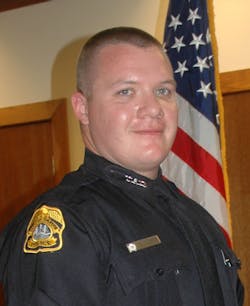Widow of Slain Tampa Officer Still Waiting for Resolution in Stolen Identity Case
TAMPA, Fla. -- Months after police Officer David Curtis was slain on duty, his widow tried to file her tax return. But the electronic filing wouldn't go through.
Someone had stolen the identity of the officer and filed a fraudulent return.
A year later, Kelly Curtis still has no resolution. On Tuesday, her ordeal was a subject of a U.S. Senate subcommittee hearing on the pervasive tax fraud problem.
"It's just so frustrating," she told the Tampa Bay Times. "Here Dave's ultimate sacrifice is being taken advantage of again.
"And I've just been thrown something else on my plate that I've got to deal with. Sometimes I just throw my hands up in the air and say: 'No, I've had enough. I can't deal with this.' "
David Curtis and fellow Officer Jeffrey Kocab were fatally shot June 29, 2010, during a traffic stop in East Tampa. After a manhunt, Dontae Morris, 26, was arrested and accused of the slayings.
The following spring, after Kelly Curtis' tax return was denied, she spent hours talking on the phone and meeting with the Internal Revenue Service, she said. She has faxed them information numerous times.
"It's been a headache and a hassle," she said.
Federal income tax fraud is a huge problem in Tampa, where police believe scores of people are raking in millions of dollars by filing fraudulent returns.
On Tuesday, Tampa was the focus of discussion at a hearing held by the U.S. Senate Subcommittee on Fiscal Responsibility & Economic Growth.
The hearing was called to investigate what the IRS has done to battle tax fraud. The Senate is considering a bill that would allow federal and local law enforcement agencies to collaborate on tax cases, and help victims get their money more quickly if their refunds are stolen.
Tampa police Detective Sal Augeri traveled to Washington, D.C., to testify about what his department has seen. Beforehand, he asked Kelly Curtis if he could discuss her situation.
Sen. Bill Nelson, D-Fla., the subcommittee chair, was surprised it remained unresolved.
"Is it any wonder people are frustrated?" Nelson asked.
And it's more than frustrating, police say. It's dangerous. Tax fraud is leading to violent crime in Tampa, Augeri testified.
People are getting rich off these schemes, he said, and other people know it. There have been armed robberies and home invasions targeted at these fraudulent filers, police say.
An attempted homicide last week in Tampa is rumored to be motivated by tax fraud, Augeri testified.
Tampa police Chief Jane Castor told the Times robbers are looking for cash and jewelry - "the proceeds of the tax fraud."
"People on the street know who's doing it," she said. "And they want to get a share."
Tampa police have been investigating these fraud cases as identity thefts. Heftier tax fraud charges must come from federal authorities.
But despite 47 local arrests in September, there haven't been any federal indictments involving those people, Augeri testified.
Castor said federal authorities told her these cases usually take about six months to get to the indictment stage. She's hopeful, but it's frustrating to see the accused still operating, she said.
Police believe one of the men arrested in September still may be filing fraudulent returns. They accused him of committing $9 million in fraud when they arrested him and impounded his Bentley, Castor said.
Meanwhile, police have another angle to investigate: They believe the criminals are getting personal information, including Social Security numbers, from insiders at medical offices, nursing homes and schools.
Sen. Nelson asked Augeri if police were trying to find those offending employees.
"We try to backtrack, and I can tell you this: It's very difficult," Augeri said.
Castor and Kelly Curtis said they were heartened by the Senate's action and the proposed bill. Any tools that make law enforcement's jobs easier are appreciated, Castor said, but it's not enough.
"We cannot investigate ourself out of this problem," she said. "It needs to be fixed at the point the taxes are filed."
That's because the volume is overwhelming, Castor said. When authorities rounded up the 47 people in September, she thought the number of fake returns would slow. It didn't.
"It's actually been quite the opposite, from everything that we hear from the street level," she said. "It's worse than it was last year."
Copyright 2012 Times Publishing CompanyAll Rights Reserved

